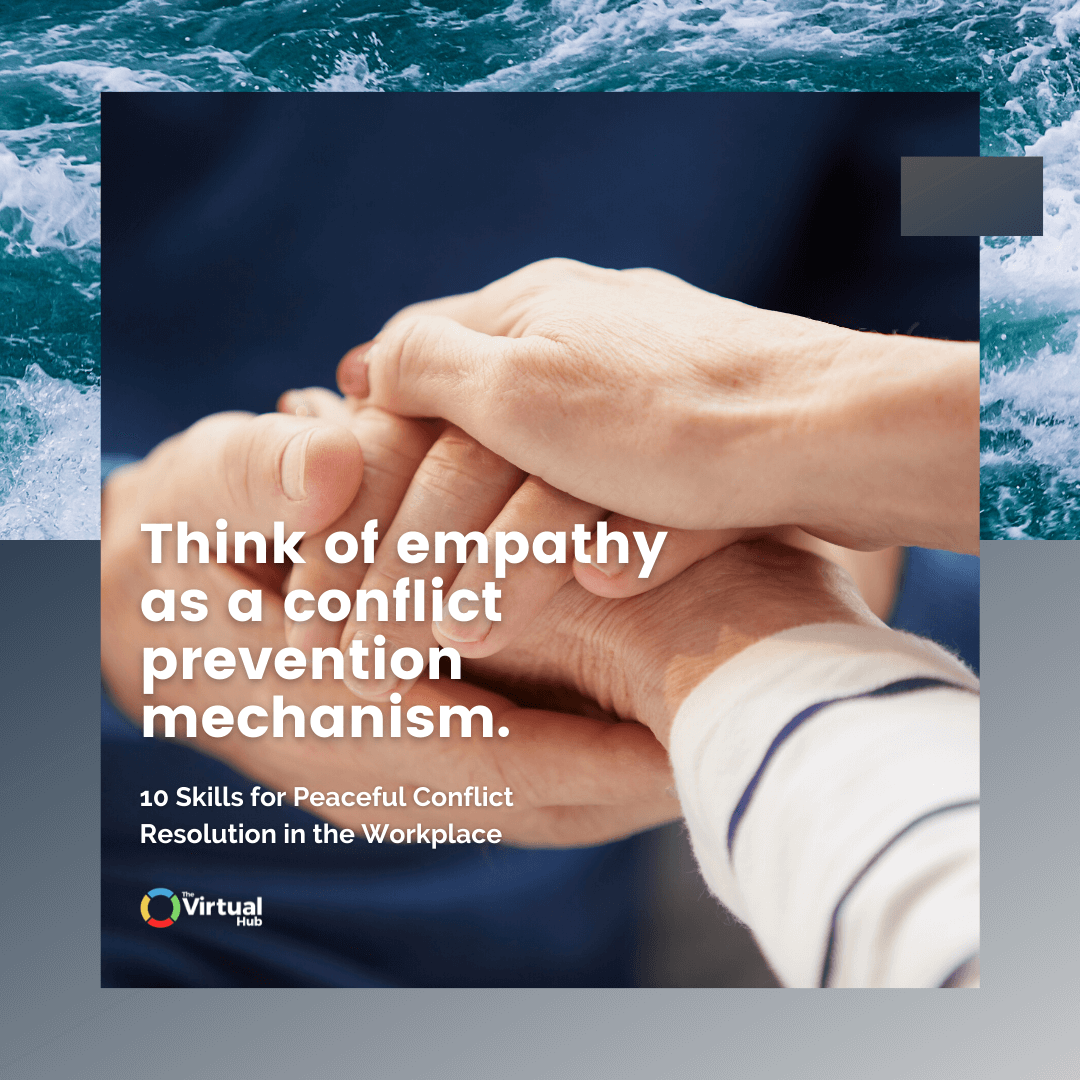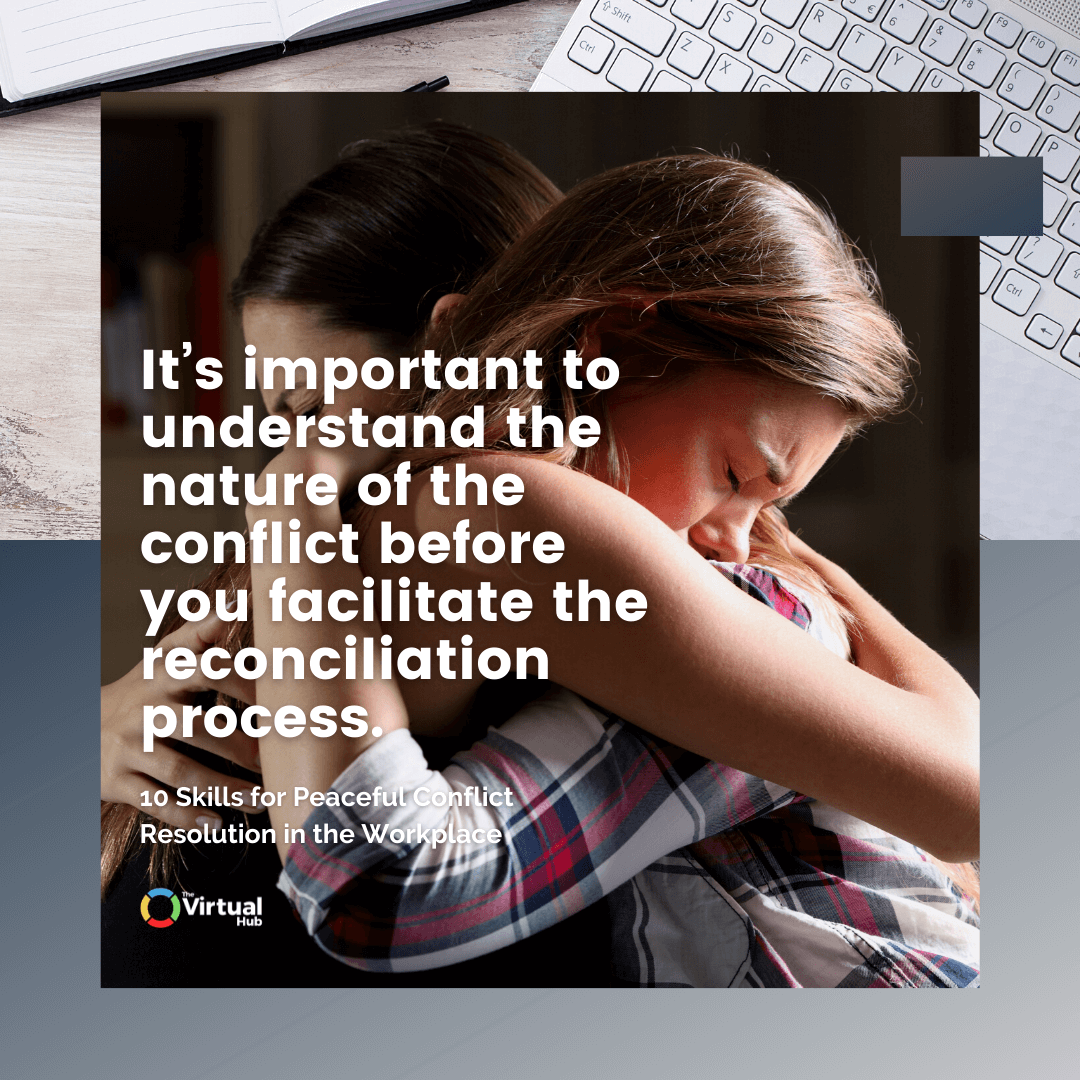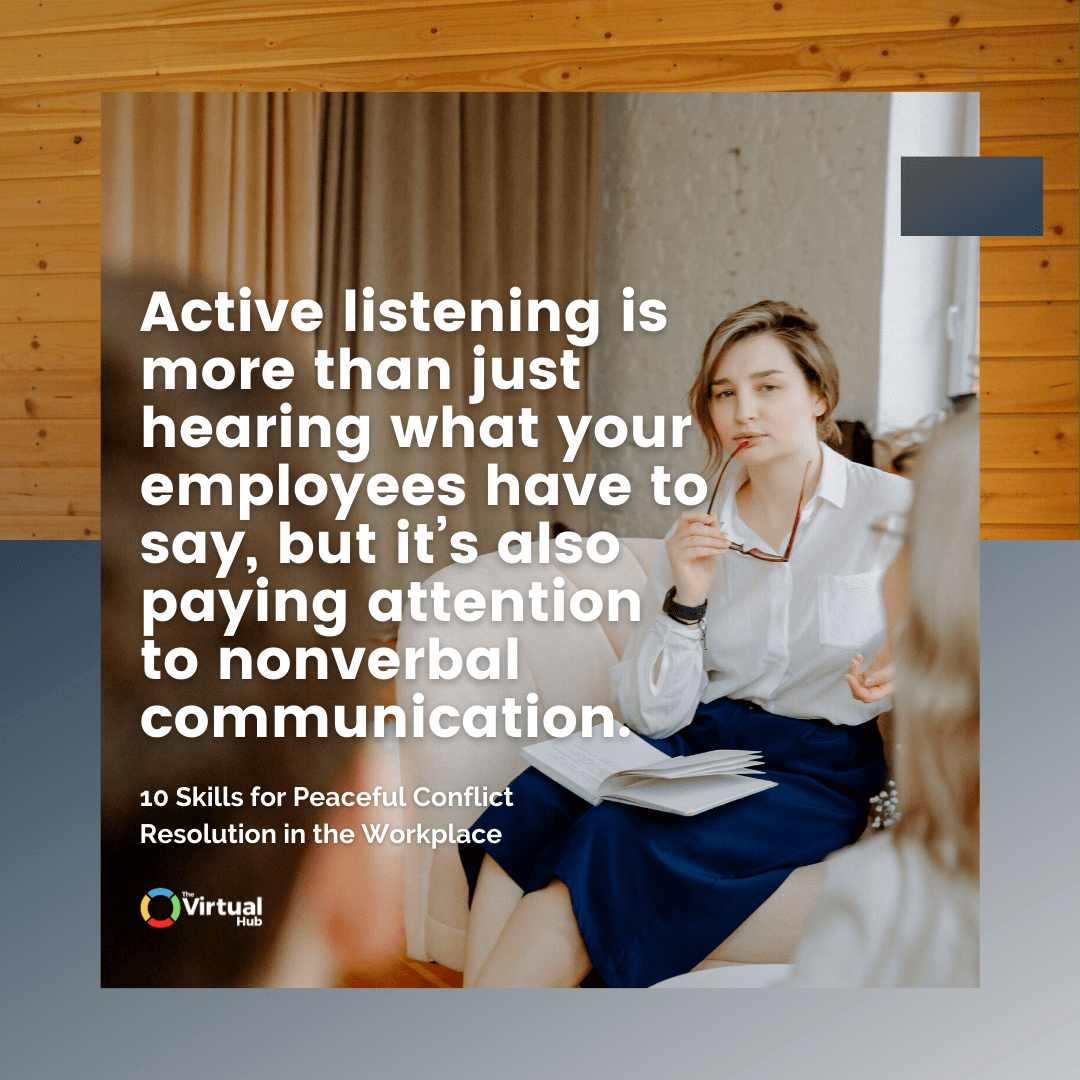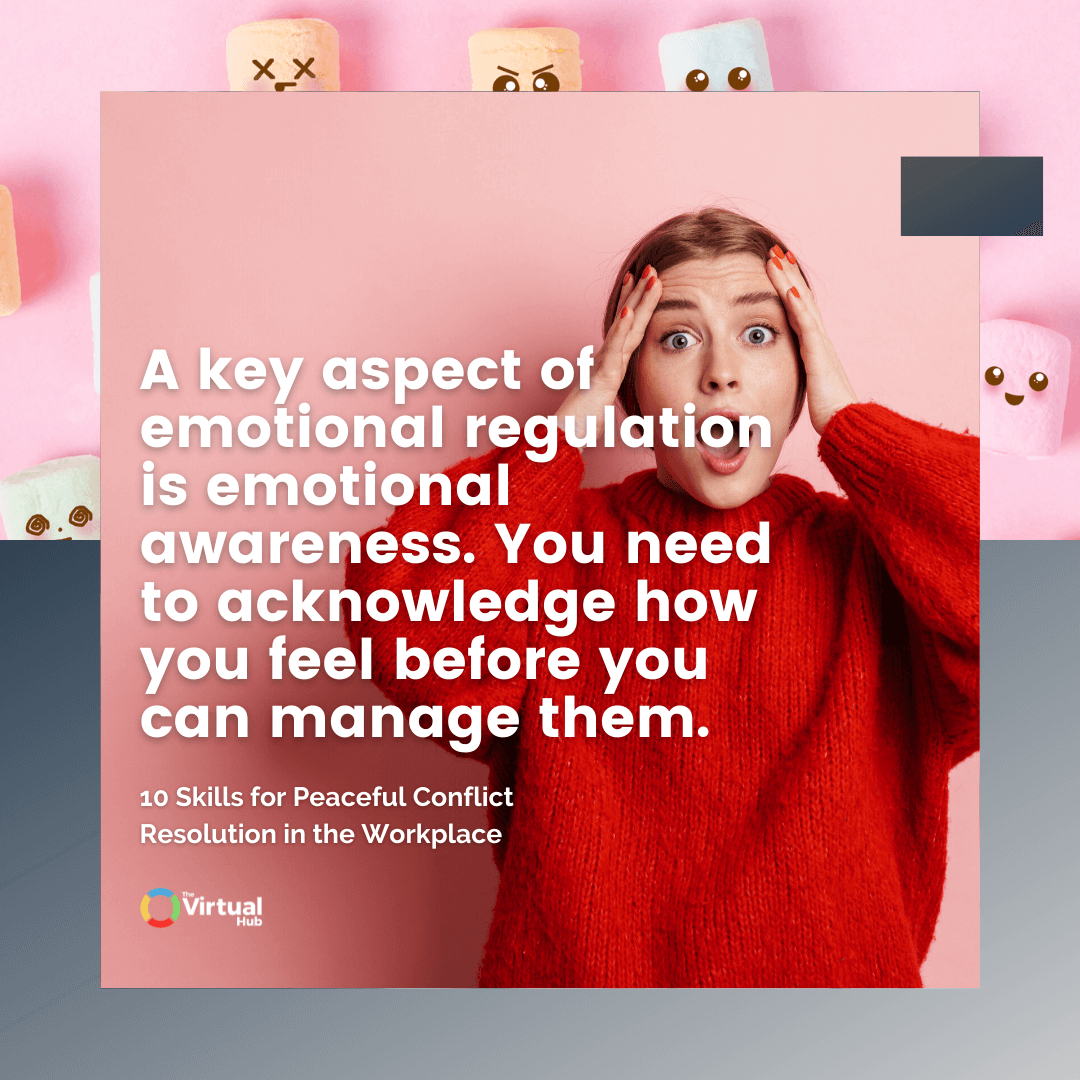Conflict is a normal part of life and, in turn, the workplace. This is especially true for businesses with a diverse workforce.
Diversity can energize your business, but differences between employees can also lead to conflicts. That’s why leaders need to have conflict resolution skills.
Read on to learn new skills and strategies that may help you maintain a harmonious and productive workplace.
RELATED: 5 Ways To Effectively Handle Conflict In Virtual Teams
Must-Have Conflict Resolution Skills in the Workplace
You can click on these links below to jump on a specific section:
What Is Conflict and What Are Its Effects in the Workplace?
Conflict is defined as “a state of disagreement or opposition between people with different interests or ideas.”
In the workplace, conflict can take many forms. It can be interpersonal, intergroup, intragroup, or even intrapersonal (within oneself).
Interpersonal conflict is the most common type of conflict in the workplace. It occurs when at least two team members have a disagreement. This type of conflict can be caused by a personality clash, differing opinions about work tasks, or competition for resources.
Intergroup conflict happens when two groups of employees have incompatible goals or scarce resources. Meanwhile, intragroup conflict takes place within a single group and is often caused by differences in opinion or values.
On the other hand, intrapersonal conflict is internal and usually results from stress or pressure at work.
Conflict can have a number of negative effects on the workplace, including:
- decreased productivity
- absenteeism
- unhealthy stress management
- turnover
- damaged relationships
However, conflict can also lead to positive outcome, such as:
- creativity and innovation
- constructive conversation and criticism
- improved team dynamics
- better decision-making process
Ultimately, whether conflict has a positive or negative effect on the workplace depends on how it's managed.
What Is Conflict Resolution?
Conflict resolution is the process of resolving a disagreement or dispute. It can be done through mediation, negotiation, or arbitration. It can also be done by simply talking things out.
When you resolve conflict, your goal is to reach a resolution that's acceptable to two or more parties. This resolution should be mutually beneficial and address the needs of all involved parties.
It's also important to note that conflict resolution is different from conflict avoidance. Conflict avoidance is when you ignore or avoid conflict altogether. This may seem like an easier option, but it can lead to bigger problems down the road.
Conflict resolution, on the other hand, is proactive. It's about taking steps to resolve disagreements before they escalate.
10 Conflict Resolution Skills
1. Lead with Empathy
Leaders set the tone for workplace culture. One of the best ways to manage conflict is to create an environment that reduces the risk of conflict. One way to do this is by leading with empathy.
What is empathy? Empathy is the ability to put yourself in someone else’s shoes. It’s what allows you to have a better understanding of where someone's coming from even if you don’t necessarily agree with them.

Think of empathy as a conflict prevention mechanism. If empathy permeates the workplace, conflicts don’t occur as often. When they do, they’re easier to manage and de-escalate.
Empathy offers other workplace benefits too. Studies show that there’s less turnover in companies with leaders who show empathic concern towards their team member.
2. De-escalate with Humor
There are different types of conflicts in the workplace, and not all of these conflicts will require a lot of time and attention. Your time is limited, so it’s important to pick and choose your battles.
Some trivial disputes will blow over naturally, so you don’t always need to intervene. As a leader though, you can help lighten the mood to encourage everyone to move forward.
One way to do this is by de-escalating with humor. It can help relieve some tension and it may be a good way to introduce a new perspective. When you use humor appropriately, it can even pave the way for stronger team connections.
Pro Tip: When it comes to using humor to de-escalate situations, make sure that you’re laughing with your employees and not at them. Otherwise, you may cause more discomfort.

3. Clarify Goals and Define the Conflict

If you do have to intervene and mediate, it’s important to clarify everyone's goals. It’s difficult to resolve conflicts if the goal of either party is to win.
It isn’t always important to figure out who’s right and who’s wrong. As a leader, your goal should always be solution-oriented.
When approaching the conflicting parties, it’s also helpful to define the conflict. In some cases, the conflicting parties may even be upset about completely different issues.
Present conflict escalates quickly if there are unresolved conflicts from the past. So it’s important to understand the nature of the conflict before you facilitate the reconciliation process.
4. Practice Active Listening
The key to understanding is to actively listen. When you listen actively, you don't just hear what your employees have to say; you also pay attention to nonverbal communication.
Remember, it’s not just what they’re saying, but how they’re saying it. A lot of times, people can articulate what they think, but not how they feel.
You can get a sense of their emotional state from their body language--the tone of their voice, gestures, posture, and facial expressions. Pay attention to all of these nonverbal cues, and allow it to inform your understanding of the conflict situation.
Make sure you’re mindful of your behavior as well. Try to maintain eye contact while the other person is talking so they know that you’re present.
Active listening skills are useful not just for conflict management. Salespeople use active listening all the time to connect with customers.
Pro Tip: Try not to interrupt and give feedback until you’re sure the person has said what they needed to say. If you feel like someone has more to say but can’t articulate it, you can ask probing questions.

5. Regulate Emotions
It’s easy to get overly invested when you’re dealing with conflicts in the workplace, especially if you’re dealing with long-time employees. Sometimes, workplace conflicts can also make managers lose their patience.
When a conflict arises though, the concerned parties are probably already dealing with their own strong emotions. So it may complicate things if your feelings get in the way. That’s why it’s important to control your emotions beforehand, also called having "emotional intelligence."

Emotional intelligence is the ability to have self-awareness and understand your own emotions, as well as the emotions of others. It’s helpful in managing conflict because it allows you to regulate your heightened emotions and respond in such a way that diffuses the situation.
In addition, keeping your emotions in check can help you to remain impartial. You’re also in a better position to provide level-headed and healthy responses to the people involved.
Pro Tip: A key aspect of emotional regulation is emotional awareness. You need to acknowledge how you feel before you can manage them.
6. Communicate Kindly and Clearly
When it’s your turn to talk, express your thoughts in a non-threatening manner. Try to avoid adding to the frustration.
At the same time, you need to make sure that you’re communicating clearly. Address the problem head-on. Sometimes, mediators can make things worse by beating around the bush.
Some leaders also provide non-specific or abstract advice. When resolving conflict, you need to make sure your suggestions are actionable. Otherwise, you may just add fuel to the fire.
Additionally, it can be helpful to set aside some time for a conflict resolution meeting, during which employees can identify conflicts, understand the other person's point of view, and come up with a plan to resolve the conflict. Conflict resolution meetings can be held on an individual basis or with a group of employees.
If you're having a conflict resolution meeting, it's important to have a neutral third party who can keep the discussion on track. The moderator should also make sure that everyone has a chance to speak and that all points of view are considered.
Pro Tip: Try to be transparent with your team. It’ll be hard for your team to trust you if they believe you have any ulterior motives.

7. Facilitate Problem-Solving

As a leader and a mediator, your role isn’t to provide an obvious solution. Try to restrict your interventions to facilitation.
Offer opportunities for encouraging collaboration and brainstorming sessions. When you facilitate problem-solving, you’re also empowering your team to use and develop their conflict resolution skills.
A top-down solution may be more convenient, but it may fail to address the root cause of the problem or resolve any negative feelings. Resolutions are more meaningful when coworkers or direct reports develop them organically.
Pro Tip: If you’re dealing with a large group, make sure you lay down some ground rules first. For example, some group facilitators encourage the use of “I” statements over “You” statements.
8. Promote Flexibility
Flexibility is an important aspect of conflict resolution. It’s easier to solve a conflict if all of the parties are willing to compromise.
So try to promote flexibility during the entire conflict management process. It’s possible to come to a mutual decision if people are willing to collaborate and compromise.
Try to encourage everyone to have an open mind. The goal isn’t getting your way, but to find a solution that works for everyone.
Pro Tip: It may help to remind everyone of the company’s values. You can find a compromise and be flexible when it comes to strategies, but it’s important to remain true to the company’s values and guiding principles.

9. Normalize Accountability
In specific types of workplace conflicts, accountability is important. Sometimes, all you need for the resolution of a conflict is sincere apology.
Normalizing accountability doesn’t happen overnight though. People need to trust their co-workers and feel like they’re in a safe enough space to admit their mistakes.

When they’re able to do this, there’s no need to point fingers anymore. The blame game can stir up strong feelings of sadness and shame.
Knowing how to say sorry is an important skill. It can save you a lot of time, so try to keep this in mind as you mold your company’s culture.
Pro Tip: Employees are more likely to take accountability and apologize when leaders or managers model similar behavior.
10. Follow-through with Mentorship
A conflict doesn’t magically resolve itself with a couple of mediation sessions. Follow-through is important to make sure that people are sticking to the agreed-upon resolution.
You also need to check in to see if working relationships are repaired. Transitioning from mediation to mentorship shows your employees that you genuinely care about them (and not just about solving a problem).
You can’t outsource mentorship to your human resources department. It'll require some of your time and attention.
Pro Tip: A great way to free up your time is by hiring a virtual assistant. You can delegate time-consuming administrative tasks to an off-shore assistant so you can focus on managing and developing the talent in your team.
RELATED: 3 Steps In Overcoming The Challenges Of Managing Virtual Teams
Conflict Resolution Strategy
One popular model of conflict resolution is the Thomas-Kilmann Model, which was developed in the 1970s. The model suggests that there are five main strategies for dealing with conflict:
Avoidance
This is when you completely steer clear of the conflict. You may feel like it’s not your place to get involved, or that the problem will resolve itself eventually.
However, avoidance can lead to simmering resentments and a build-up of anger. The problem doesn’t go away, it just gets hidden.
Accommodation
With this strategy, you essentially give in to the other person. You may be trying to maintain peace or avoid further conflict. However, this strategy can make you seem pushover.
Competition
With the competitive approach, you’re focused on winning at all costs. You might see the other party as an adversary who needs to be beaten. This can quickly escalate into a power struggle.
Collaboration
This is when you work with the opposing party to find a solution that meets both of your needs. It requires effective communication and willingness to compromise.
Compromise
With this strategy, you both agree to meet in the middle. You might each give up something that’s important to you, but it’s a way to move forward.
Which strategy you choose depends on the situation. In some cases, it might make sense to avoid the conflict altogether. However, in other cases, you may need to be more assertive and collaborative in order to find a resolution.
Different Conflict Management Skills to Develop
In addition to the conflict resolution strategies above, there are a few other skills that can help you manage conflict effectively:
Negotiation
This is the art of coming to an agreement. It’s about finding a solution that works for both parties involved. This may require some give and take, but ultimately it’s about finding a win-win situation.
Positive Attitude
It’s important to approach conflict with a positive attitude. This doesn’t mean you have to be friends with the person you’re in conflict with, but it does mean approaching the situation with a willingness to find a resolution.
Patience
Conflict resolution can be a long and frustrating process. You need to be patient in order to see it through to the end. This means trying to remain calm and level-headed, even when things are heated.
Final Thoughts
Conflict is inevitable in any workplace. However, how you deal with conflict can make all the difference.
So don’t sweep conflicts under the rug! Use these strategies to help manage conflicts in your workplace.
